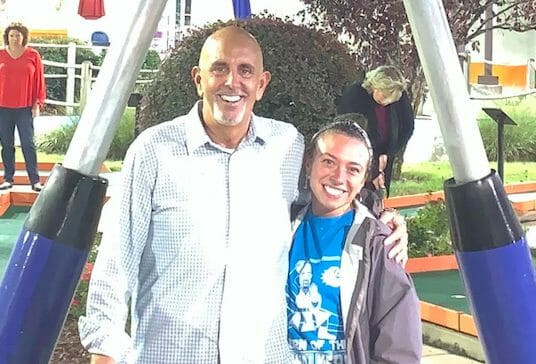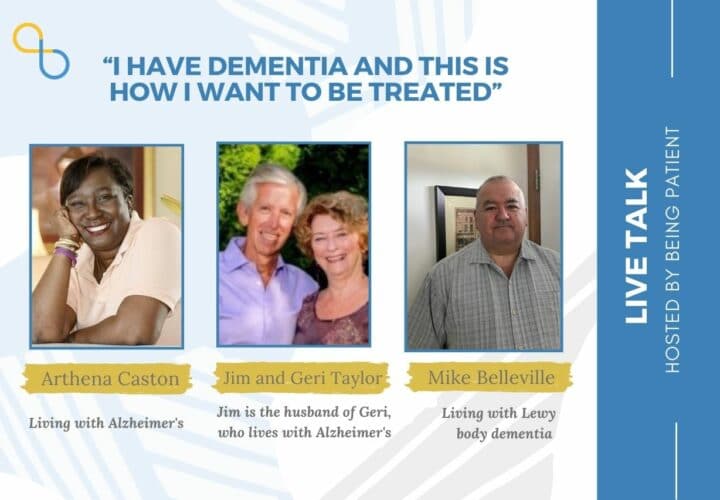Voices of Alzheimer's is a new organization dedicated to elevating the stories of people living with the disease.
Here’s how VOA’s 5 founders — including reporter Phil Gutis — responded to recent Aduhelm Medicare announcement. A few months ago, I received an email from a dynamo by the name of James Taylor (no, not that James Taylor.) This James Taylor is the care partner for his wife, Geri, who was diagnosed with Alzheimer’s 10 years ago. In the years since Geri’s diagnosis, Jim has poured his heart and soul into finding a treatment for Alzheimer’s and improving care for those with the disease. He had a new idea he wanted to explore.
What if we were to launch a small organization — which we ultimately named Voices of Alzheimer’s — to provide a forum for people living with Alzheimer’s and other dementias to make their voices heard?
Our newly formed organization, Voices of Alzheimer’s, will share the stories of people living with Alzheimer’s and other dementias with the goal of inspiring and informing others on how to live well, tackle challenges and provide opportunities to advocate for change.
One of our first “official” activities was to respond to the January 11, 2022 decision by the Centers for Medicare and Medicaid Services to not cover the costs of the FDA-approved treatment aducanumab for people living in the earliest stages of Alzheimer’s.
In our statement, we made clear that we are not researchers or clinicians, only citizens whose lives have been dramatically altered by our diagnosis. And we expressed our deep dismay at CMS’s preliminary decision and asked how such a negative decision is justified.
One of VOA’s primary goals is to encourage the development of effective therapies to cure, prevent, delay and better manage Alzheimer’s and related dementias. We strongly encourage early diagnosis and participation in clinical trials.
We noted that the FDA has declared aducanumab is sufficiently effective and safe for approval, and Biogen has announced a Phase Four trial to gather further evidence of efficacy and safety will begin soon and be completed in four years. And under federal law, cost must not be a factor in the CMS decision. Why is Biogen’s Phase 4 trial, approved by the FDA, not a sufficient tool to gather the additional evidence that CMS desires?
(In February 2024, Biogen took Aduhelm off the market indefinitely.)
***
Each of the founding members of Voices of Alzheimer’s has been diagnosed with the disease. Our ages at diagnosis range from 42 to 69. For each of the five of us, the Alzheimer’s diagnosis brought great personal change.
One founder, Rebecca Chopp, stepped down as Chancellor of the University of Denver. Another, Jay Reinstein, left his position as Assistant City Manager for the City of Fayetteville, NC. Anitra Mostacero, a senior master sergeant in the U.S. Air Force, was diagnosed at age 42. Geri Taylor retired early from her position as a heathcare executive in NYC.
Each of the founding members of Voices of
Alzheimer’s are dying from this disease, and yet CMS proposes
to deny us access to successive Alzheimer’s disease-modifying
therapy because of bureaucratic gobbledygook.
I was diagnosed at 56 and have since been living on Social Security disability and investment income.
Geri Taylor has also been a long-term participant in the clinical trial for aducanumab, and strongly believes she has benefited from participation in the trial. Reinstein hopes to start the now-approved drug within a few months if he can afford the medication.
It is our strong belief that broad access to this break-through medication and those that will follow is critically important to our community, and, as mentioned above, we were distressed by the preliminary CED classification (coverage with evidence development, which means that FDA-approved drugs in this class would be covered for people with Medicare only if they are enrolled in qualifying clinical trials) of Aduhelm on January 11.
Beyond broadly restricting Aduhelm, we believe that the CMS’s requirement that successive Alzheimer’s monoclonal antibody drugs, regardless of their own merits, be classified in the same restrictive category is unconscionable.
Each of the founding members of Voices of Alzheimer’s are dying from this disease, and yet CMS proposes to deny us access to successive Alzheimer’s disease modifying therapy because of bureaucratic gobbledygook.
Until last June, there have been no effective medications to prevent, slow, or cure Alzheimer’s disease, and no new drugs have been approved for this disease in nearly 20 years. With the approval of Aduhelm, Biogen and the FDA lit a bright candle of hope for our entire community.
While not a cure, Aduhelm has the potential to lengthen and improve the quality of our lives. With its proposed CED classification for Aduhelm, CMS threatens to snuff out this light and disappoint us once again.
***
Many, many members of our community are despondent, having so few positive alternatives to improve the quality of their lives. VOA tries to personify living well with dementia and encourage others to do so, and we seek to recruit all communities to participate in Alzheimer’s clinical trials, but this single decision will set back our efforts dramatically: As CMS has correctly pointed out, a CED decision will have its greatest impact on marginalized and rural communities, which will not have access to a registry or large institution gathering additional data. Yet despite this acknowledgement, CMS proposes to toss aside these communities, communities that in fact are in the greatest need. African Americans and Hispanic Americans develop the disease at twice and 1.5 times the rate of white Americans; yet these communities are greatly underrepresented in Alzheimer’s research today.
A significant factor in low minority trial participation is lack of trust. Yet, once again, the government, after raising hopes for an Alzheimer’s disease modifying therapy, has declared that it will be available primarily to affluent, white Americans — not the communities who have the greatest need, the communities whose trust and trial participation we seek to encourage.
***
This is not the first time that the Centers for Medicare and Medicaid have dashed the hopes of the Alzheimer’s community. Almost a decade ago, the agency declined in 2013 to cover the cost of the PET scans that are commonly used in clinical trials to help diagnose mild cognitive impairment and Alzheimer’s.
In a decision eerily reminiscent of the struggle over Aduhelm and other pending monoclonal antibody drugs, the FDA had approved the tracer used with the PET scans but Medicare declined to pay for it. To this day, Medicare continues to be unwilling to pay for these critical PET scans, leading some to argue that it continues to deter advancement in the field.
Our Voices of Alzheimer’s statement concluded by noting that those of us living with Alzheimer’s, along with the rest of America, are beyond ready for a treatment that has shown promise in delaying the development of this disease. And we strongly urged CMS to reconsider its preliminary decision and grant Aduhelm and other potential monoclonal antibody drugs full coverage, thus providing broad access for all Americans.
CMS has begun taking public comment on its preliminary decision. If you share our disappointment with this decision, please add your voice at the CMS website. Comments are being accepted through Tuesday, February 10th — and I’m proud to say that the official comments from VOA are the first ones on the list.
Being Patient is committed to representing a diversity of voices in the Alzheimer’s and brain health community, and to providing a platform to elevate the perspectives of people living with neurodegenerative diseases. Being Patient publishes op-eds at the discretion of the editorial staff. To share an op-ed for consideration, submit concepts or drafts to our managing editor at alex@beingpatient.com.
UPDATE, 20 November 2023: As of a landmark policy change in October 2023, Medicare now covers beta-amyloid PET scans for diagnosing Alzheimer’s disease.
UPDATE: 3 March 2024, 9:01 P.M. ET.In February 2024, Biogen took Aduhelm off the market, citing financial concerns. Although the drug did receive accelerated, conditional FDA approval for the treatment of early Alzheimer’s disease in 2021, it is no longer available to new patients. The company announced it would sunset trials in May 2024 and cease supplying the drug to current patients in November 2024.






